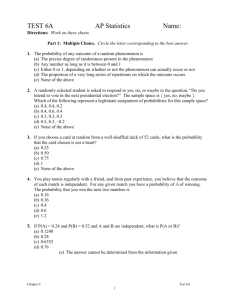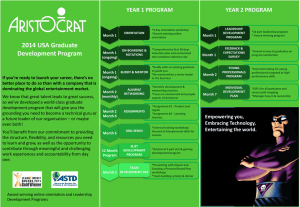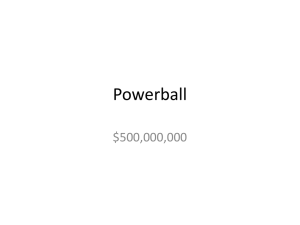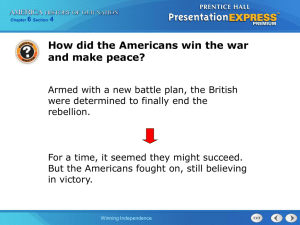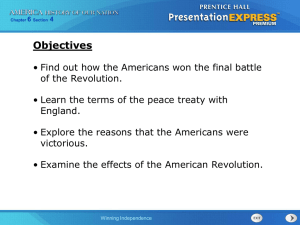Chapter 15: Probability - Village Christian School
advertisement
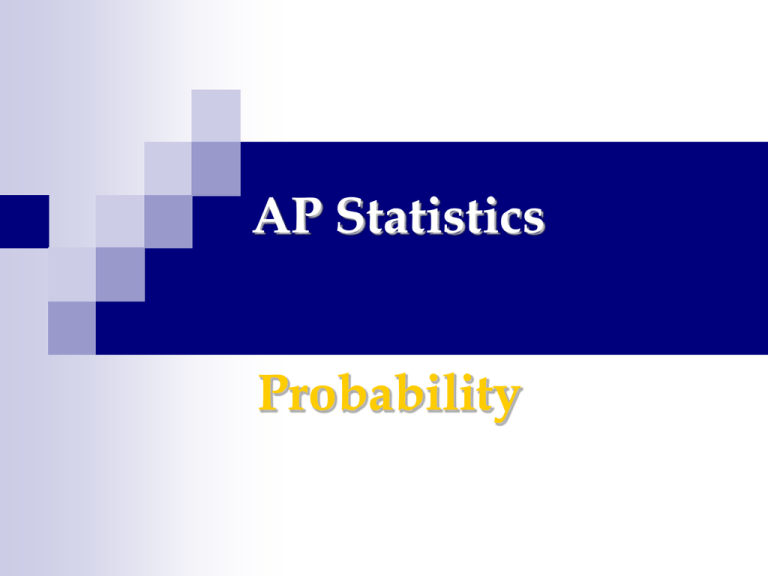
AP Statistics
Probability
Problem 1
Suppose you are given a standard 6-sided die
and told that the die is “loaded” in such a way
that while the numbers 1, 3, 4, and 6 are
equally likely to turn up, the numbers 2 and 5
are three times as likely to turn up as any of
the other numbers.
Fill in the following probability distribution table:
Outcome
Probability
1
.1
2
.3
3
.1
4
.1
5
.3
6
.1
2
Problem 2
Outcome
Probability
1
.1
2
.3
3
.1
4
.1
5
.3
6
.1
Let A be the event: the number rolled is a
prime number (a number is prime if its
only factors are 1 and the number itself;
note that 1 is not prime). List the
outcomes in A and find P(A).
A = {2, 3, 5}
P(A)=P(2) + P(3) + P(5)= 0.3 + 0.1 + 0.3 = 0.7
3
Problem 3
Outcome
Probability
1
.1
2
.3
3
.1
4
.1
5
.3
6
.1
Let B be the event: the number rolled is
an even number. List the outcomes in B,
and find P(B).
B = {2, 4, 6}
P(A)=P(2) + P(4) + P(6)= 0.3 + 0.1 + 0.1 = 0.5
4
Problem 4
Outcome
Probability
1
.1
2
.3
3
.1
4
.1
5
.3
6
.1
Are events A and B disjoint? Explain
briefly.
No the events are not disjoint. Since both A
and B contain the outcome 2, the events have an
intersection and are not disjoint.
5
Problem 5
Outcome
Probability
1
.1
2
.3
3
.1
4
.1
5
.3
6
.1
Determine if events A and B are
independent.
We know that P(A and B) = P(A)P(B) if and
only if they are independent.
We also know that P(A and B) = 0.3; P(A) = 0.7,
and P(B) = 0.5
However, P(A and B) ≠ P(A)P(B) since P(A and
B) = 0.3 and P(A)P(B) = (0.7)(0.5) = 0.35.
Therefore, A and B are not independent.
6
Problem 6
Consolidated Builders has bid on two large
construction contracts. The company president
believes that the probability of winning the first
contract (event A) is 0.7, that the probability of
winning a second (event B) is 0.4, and that the
probability of winning both jobs is 0.2.
What is the probability of the event {A or B} that
Consolidated will win at least one of the jobs?
P(A or B) = P(A) + P(B) – P(A∩B) = 0.7 + 0.4 – 0.2 = 0.9
7
Problem 7
Consolidated Builders has bid on two large
construction contracts. The company president
believes that the probability of winning the first
contract (event A) is 0.7, that the probability of
winning a second (event B) is 0.4, and that the
probability of winning both jobs is 0.2.
Draw a Venn diagram that shows the relation
between the events A and B
S
A
0.5
B
0.2
0.2
0.1
8
Problem 8
Consolidated Builders has bid on two large
construction contracts. The company president
believes that the probability of winning the first
contract (event A) is 0.7, that the probability of
winning a second (event B) is 0.4, and that the
probability of winning both jobs is 0.2.
Write each of the following events in terms of A, B, AC, and BC.
Find P(Consolidated wins both jobs)
P(A and B) = 0.2
9
Problem 9
Consolidated Builders has bid on two large
construction contracts. The company president
believes that the probability of winning the first
contract (event A) is 0.7, that the probability of
winning a second (event B) is 0.4, and that the
probability of winning both jobs is 0.2.
Write each of the following events in terms of A, B, AC, and BC.
Find P(Consolidated wins the first job but not the
second)
P(A and BC) = 0.5
10
Problem 10
Consolidated Builders has bid on two large
construction contracts. The company president
believes that the probability of winning the first
contract (event A) is 0.7, that the probability of
winning a second (event B) is 0.4, and that the
probability of winning both jobs is 0.2.
Write each of the following events in terms of A, B, AC, and BC.
Find P(Consolidated does not win the first job but
does win the second)
P(AC and B) = 0.2
11
Problem 11
Consolidated Builders has bid on two large
construction contracts. The company president
believes that the probability of winning the first
contract (event A) is 0.7, that the probability of
winning a second (event B) is 0.4, and that the
probability of winning both jobs is 0.2.
Write each of the following events in terms of A, B, AC, and BC.
Find P(Consolidated does not win either job)
P(AC and BC) = 0.1
12
Assignment
Chapter 15
Lesson:
Probability
Read:
Worksheet:
Chapter 15 Probability WS
13
